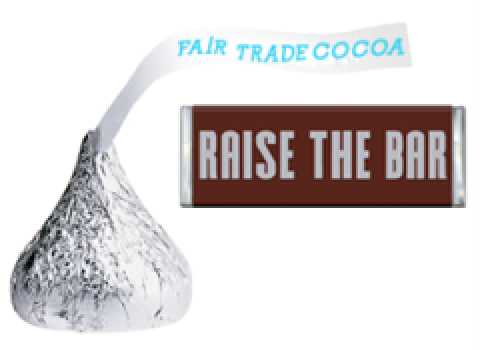
On October 3, the Hershey Company announced that by 2020, all of the cocoa it sources will be independently certified, according to a press statement, "to assure that it is grown in line with the highest internationally recognized standards for labor, environmental and better farming practices." The following article, written by Cathy Rowan, was published in the November-December 2012 NewsNotes.
Seventy percent of the world’s cocoa is grown in West Africa, specifically Ghana and the Ivory Coast, where tens of thousands of children are forced, often trafficked, to work on cocoa plantations, and small farmers are unfairly compensated for their crops. Certified cocoa accounts for five percent of the total volume of cocoa in the world today, and practically all of the major cocoa buyers have been cited for labor abuses.
For a number of years, Hershey has been the focus of consumer campaigns by such groups as the Raise the Bar, Hershey! campaign of Green America, Global Exchange and the International Labor Rights Forum. The organizations have been calling on the company to end child and forced labor in its supply chain and start sourcing Fair Trade certified cocoa. Of all the major chocolate companies, based on what it has publicly disclosed, Hershey has done the least in ensuring that cocoa production in West Africa is free of forced and child labor.
In 2008, Hershey received a shareholder proposal from members of the Interfaith Center on Corporate Responsibility (ICCR), and since then ICCR members have pressed the company to source cocoa in a manner that 1) can verify that none of the worst forms of child labor are being used in the supply chain; 2) traces the cocoa from the farm of origin through every step of the supply chain to the finished product; and 3) pays a just price to farmers growing the cocoa.
While Hershey’s Dagoba Organic chocolate is currently produced from Rainforest Alliance certified farms and the company had previously announced its commitment to make its Bliss line Rainforest Alliance-certified by year-end 2012, the move to accelerate certification across all its product offerings is welcome and encouraging news.
With a 43 percent share of the U.S. chocolate market, ICCR views Hershey’s decision as an important advancement that is certain to influence the industry and result in more sustainable cocoa farming and production.
Kate Walsh of the Tri-State Coalition for Responsible Investment and co-leader of the ICCR dialogue with Hershey said in an ICCR statement: "As Hershey owns the lion’s share of the U.S. chocolate market, we are pleased to see such a substantial commitment from the corporation. While there is no one solution to injustices such as forced labor, Hershey’s commitment has helped raise the industry bar and is further acknowledgement of the reputational risks that non-certified brands face. We look forward to receiving more information around the upcoming certifications."
The Raise the Bar, Hershey! campaign said it was "pleased that Hershey is announcing 100 percent certification for its cocoa by 2020. To truly address child labor, Hershey needs to make sure it is certifying all of its cocoa Fair Trade, the only certification that adequately addresses the Worst Forms of Child Labor [as identified by the International Labour Organization]. Hershey should certify and label one of its top-selling, brand name bars Fair Trade within the next year, and should certify and label all of its chocolates Fair Trade by 2020. We urge Hershey to reveal how the company plans to get to 100 percent certification by disclosing the certifiers it will be working with as well as a timeline for converting specific product lines."
Indeed, how Hershey will certify its cocoa supply is a key question. On January 1, 2012, Fair Trade USA (FTUSA) left Fairtrade International (FLO), the dominant certifier of Fair Trade products, and companies faced a choice about how to participate in the Fair Trade certification process. As the Fair Trade Resource Network said, "An era of significant competition greatly accelerated between certifiers and labels in Fair Trade."
The global cocoa supply is under threat due to growing demand, climate change and tree diseases. Cocoa companies are realizing the farmers they source from need to adopt sustainable agriculture practices. In addition, thanks to pressure from civil society, the companies are beginning to see that cocoa growers need to be paid just wages in order to stay on their farms and that human rights violations must stop.
